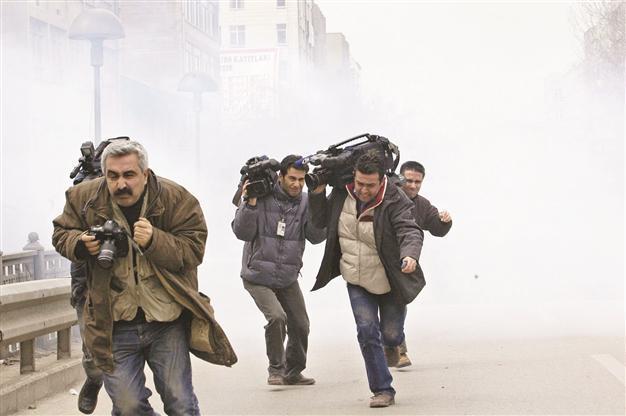Police- correspondence course opens a debate
ISTANBUL- Hürriyet Daily News

The course will be available to journalist candidates and reporters. DAILY NEWS photo, Selahattin SÖNMEZ
The Turkish National Police Academy is preparing to launch a “police correspondence course” as a new step in its journalist training program following its “war journalism course,” which was conducted in cooperation with Turkey’s state-run Anatolia news agency.
But while the new course’s details remain unclear, it has already drawn reaction from journalists and related unions.
The president of the Turkish Police Academy, Remzi Fındıklı, announced the launching of the new courses last week, according to a daily Akşam report published yesterday.
The course will be available to journalist candidates and professional reporters, while the trainers will be chosen from experienced police correspondents and police officers, the report said.
The International Center for Terrorism and Transnational Crime (UTSAM) will be in charge of conducting the courses under the Department of Research Centers of the Police Academy.
Ercan İpekçi, the head of the Journalists’ Union of Turkey, said Turkish police could only provide training for protection from police violence not journalism.”
“Police academy should educate policemen since they are the ones engaging violence against journalists. This is unacceptable, it is a part of a major plan restraining journalism in Turkey,” İpekçi told the Daily News yesterday. He also said his union was calling on colleagues to boycott such an “education.”
Professor Esra Arsan from Istanbul Bilgi University’s Media and Communications Department said this was a perfect example of “embedded journalism.”
“Journalists and police officers share the same boat but they are against each other by nature of these professions. Especially in a country that faces the risk of being a police state, such a course is extremely dangerous. The ones who have the right to use force against people and the ones who aim to reveal the wrong end of the stick cannot work in tandem,” Arsan told the Hürriyet Daily News yesterday in a phone interview.
The strongest reaction came from Ahmet Abakay, chair of the Ankara-based Contemporary Journalists’ Association (ÇGD), who said the move was tantamount to raising “police journalists.”
“Journalism is not a profession to be a toy in the hands of the state. Journalists study in the communication faculties and they learn the basic principles,” he said.
On the other hand, Press Institute Association (BED) board member Haluk Şahin said that if the institution’s courses did not require accreditation for being a police correspondent, then they were acceptable as “the police academy is a specialist school.”
War journalism courses continue
UTSAM at the Turkish National Police Academy started a joint certificate program for war journalism with Anatolian news agency on June 4. Journalists who are currently employed in printed and visual media can participate in the program, the institution’s website said.
“Successful students will be certified as war journalists, and the program will also be extended to foreign correspondents in the future,” the site said.
“The ongoing war journalism course aims to help journalists survive in conflict zones,” said the agency’s chief executive officer, Kemal Öztürk, adding that it was not risking the ethics of journalism.
“This is a career education; we have opened the third center of its kind in the world. The BBC has been doing the same and there is another center that trains war journalists in the United States. We are teaching reporters how to act in a war zone,” Öztürk told the Daily News.
When Öztürk was asked if an accreditation requirement was on the way for the war correspondence class, he said it was not an option.
